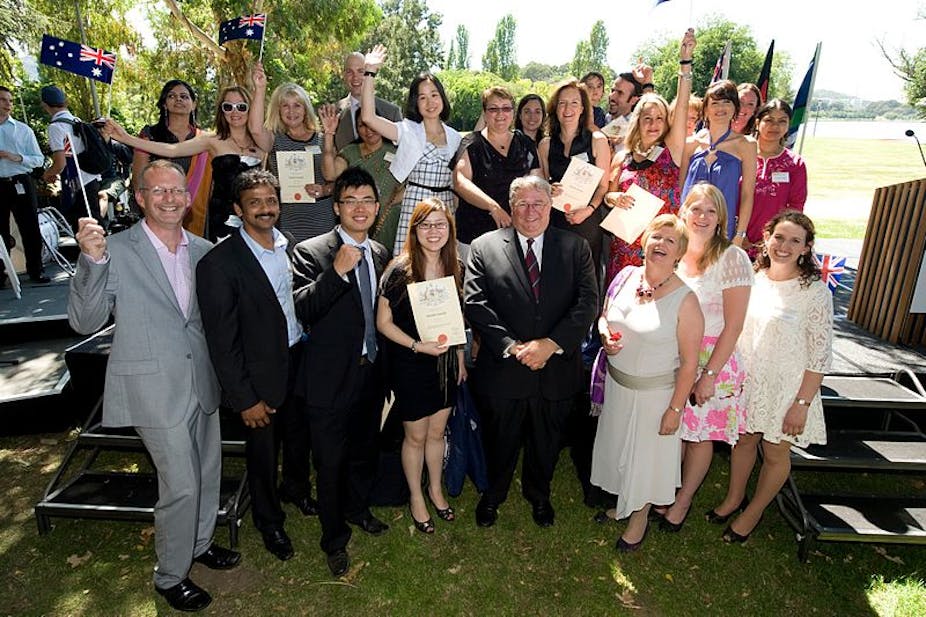This Australia Day, thousands of migrants and refugees will stand proudly and pledge their loyalty to Australia and its people at citizenship ceremonies around the nation. The citizenship pledge is considered to be the most important step in becoming an Australian citizen. It symbolises the ideas behind what we have come to know as “Australian values”.
We all remember Australian values. They were a favourite mantra of former prime minister John Howard. On the first Australia Day following the Cronulla riots, he reminded us that “Australia’s dominant cultural pattern” was comprised of:
…Judeo-Christian ethics, the progressive spirit of the Enlightenment and the institutions and values of British political culture.
Howard was not the first Liberal prime minister to espouse the virtues of Australian values. In 1981, Malcolm Fraser said that multiculturalism was about “cultural and ethnic differences set within a framework of shared fundamental values”. Those values, the same ones that today we call “Australian”, celebrated diversity. They helped define the new policy of multiculturalism, which Fraser was committed to implementing in his time in office.
In a recent interview with Fraser, he told me that he did not believe that today he could easily define what a unique Australian value is, but that it might be more useful to speak of objectives:
If you want a peaceful, prosperous society, you’ve got to give citizens a decent future. And the values that you need to embrace are really universal. And that applies to a poor African village or to a wealthy European society. You want law and order. You want education. You want health services … It’s sometimes hard to define the difference between a value and an objective.
As the next Liberal prime minister to be elected after Fraser, Howard had a different view on how Australian values should work. He made it mandatory for all migrants, refugees and long-term visitors to read about Australian values, memorise them, promise to live by them by signing the Australian Values Statement and respond to three mandatory questions about them in order to pass the Australian citizenship test.
Above all, Howard transformed Australian values into the superior and unique qualities of “old Australians”. He offered them as a replacement for the policy of multiculturalism, which he was committed to dismantling during his time in office.

When the Rudd government came to power, it took the controversial Australian values in the citizenship test and repackaged them as the “principles and responsibilities” embedded in the citizenship pledge.
Today, Australian values have become part of our national identity. This is an identity that continues to reassure “real” Australians that our way of life is safe from terrorists, queue jumpers and men who don’t respect women.
But, as our national day approaches, who gets to decide what Australian values are? Who gets to define and protect the Australian way of life?
In the past, Australia’s identity has been defined by experts in academia, politics, history and law, such as Sir Ninian Stephen, Richard Woolcott, [John Hirst](http://en.wikipedia.org/wiki/John_Hirst_(historian) and Kim Rubenstein. Australian values even featured in the controversial 1988 FitzGerald Report on immigration and multiculturalism.
And in a sports-obsessed nation like Australia, it is no surprise that government reports and teaching resources relating to our civic duties have included the expertise of sporting legends including Mark Ella, Rechelle Hawkes, Don Bradman, Cathy Freeman and Evonne Goolagong.

Occasionally, governments have also appointed “multicultural Australians” such as Paula Masselos and Juliana Nkrumah to define our identity. However, this is more the exception than the rule. Australia’s national representatives continue to be predominantly white men who share a British and Judeo-Christian heritage.
So what does Tony Abbott, the faithful disciple of Howard and Australia’s newest Liberal prime pinister, think of Australian values? Abbott has promised the nation that he will “strive to govern for all Australians” and that his will be “a problem-solving government based on values, not ideology”.
But Abbott has not elaborated on what these values will look like. Too preoccupied with stopping the boats and repealing the carbon tax, it has been left up to media mogul Rupert Murdoch to define Australian values and the institutions that sustain them. Abbott has also remained tight-lipped about whether multiculturalism will play a future role in defining Australia’s national identity.
What is now largely needed from the government, and specifically demanded of Abbott’s cabinet, is an articulation of “Australian-ness” that includes more Australian women, more migrant Australians and more indigenous Australians (not just the athletic type) who will come together to define the multiple ways of being model citizens.
So, as new citizens take the citizenship pledge on Australia Day this year, let’s hope that Abbott makes it his objective to promote an Australian identity based on a set of multicultural values that have been defined by and for all Australians.

